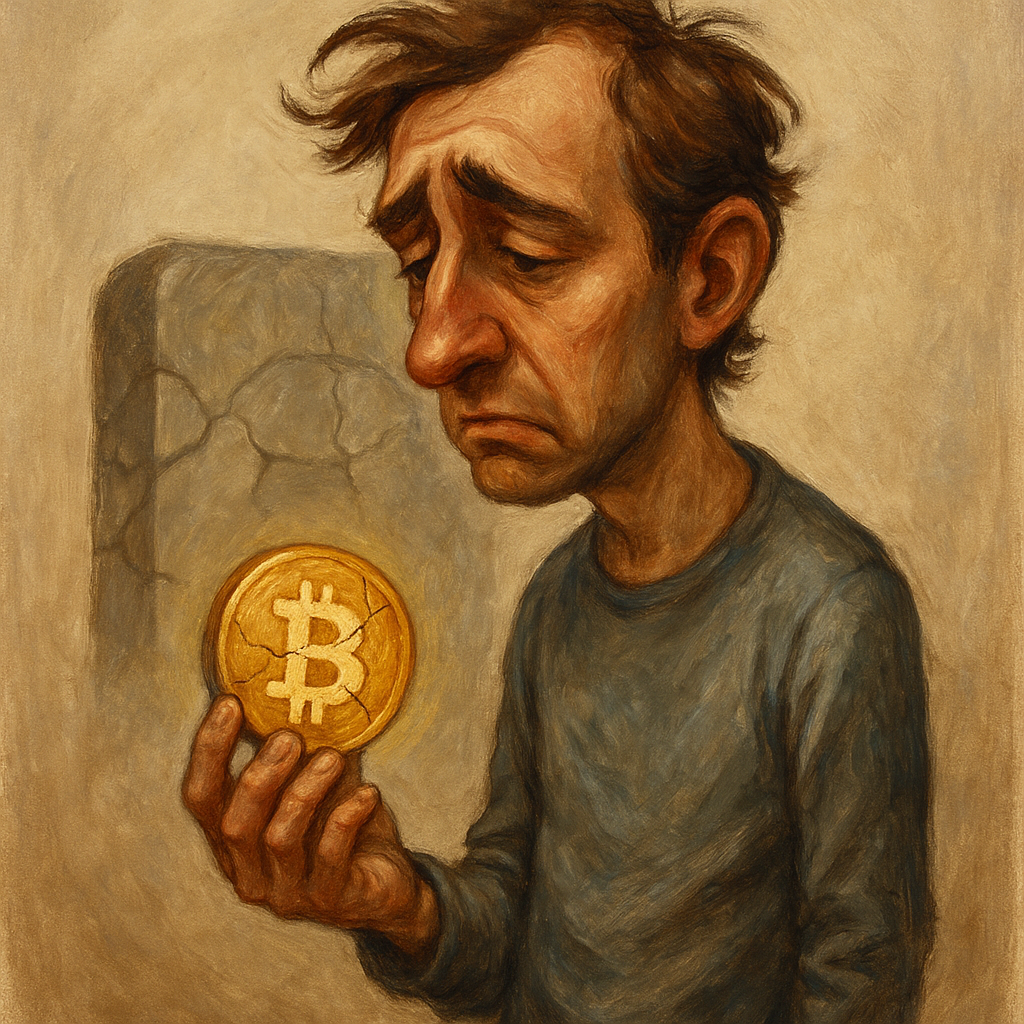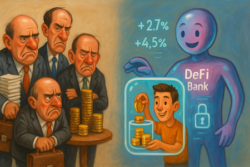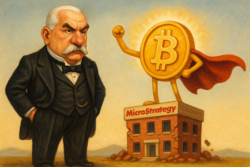- Bitcoin was supposed to replace fiat money
- No better than Airbnb or Uber in the end
- A quadrillion dollar insurrection is coming
Bitcoin was created to usurp the fiat money system. That’s why the first Bitcoin block, known as the Genesis Block, quotes this headline from The Times newspaper: “The Times 03/Jan/2009 Chancellor on brink of second bailout for banks”. Calling out our unfair financial system is literally in Bitcoin’s DNA.
The deeply unfair rescue of bankers, with freshly printed money, infuriated all of us at the time. The only thing worse was letting Lehman Brothers fail…
Either way, the bailouts were also a wakeup call. It exposed the nature of money had changed radically.
Politicians had pretended for decades that the government budget is constrained by borrowing and taxes. We can’t spend more on the NHS, welfare or defence. Money doesn’t grow on trees, you know!
But as soon as the bankers need a bailout, we can just print the money needed! Hundreds of billions were created out of nothing…
But if the magic money tree is real after all, what about Quantitative Easing for the bonusless masses?
Victim mentality offers low returns
Even in 2009, not everyone understood how the nature of money had changed. Some people responded by trying to Occupy Wall Street in protest, for example.
One of the strangest experiences in my life was swinging on a flying trapeze rig set up next to the Occupy Wall Street protest camp in Melbourne’s CBD…
But homelessness is only one way to protest against a monetary system that unfairly favours bankers. You can also choose to opt out of the system by buying gold.
Indeed, gold bugs had been warning about fiat money for decades. And they were handsomely rewarded for their superior understanding of its flaws. The gold price has outperformed stocks over most timeframes for decades.
But it was cryptocurrencies that triggered the great awakening. After all, cryptocurrencies like Bitcoin only make sense in the context of a failed and unfair currency. Otherwise, you wouldn’t need it. That’s why bitcoin’s 2009 launch date is no coincidence.
Anyone who took an interest in Bitcoin became a de facto libertarian about the monetary system. And that was a lot of people.
All of a sudden, more and more of us understood what was wrong with government money. They could explain the flaws of central banking. It became cool to chant “End the Fed” at political rallies. An awakening on par with the election of Javier Milei in Argentina.
Bitcoin was supposed to offer people an alternative to this deeply unfair and manipulative monetary system. A much better option than joining a protest camp in a tent, if you ask me.
Bitcoin promised a libertarian economic nirvana. Money would be in the hands of the people instead of governments and banks. The money supply would be limited, people wouldn’t need to use banks and no government could stop a transaction. Transactions would become instant, free and global – better than gold.
This would solve all our problems. “Bitcoin fixes that” was the response to every inconvenience and disappointment of our financial system for years.
But the Bitcoin revolution has since fallen short, for all sorts of reasons.
Revolutionaries become their own worst nightmare
It reminds me of Airbnb and Uber. These companies were designed to destroy a government monopoly in the form of licensing. And replace it with something better. Suddenly, anyone could become a hotel or taxi driver.
But it didn’t take long for those companies to become the very evil they’d sworn to destroy. These days, both Airbnb and Uber are in cahoots with the government as much as their local cab and hotel industry.
Copious amounts of unnecessary fire extinguishers and fire doors clog up Airbnb hallways. Thanks to the stupidest regulations I’ve come across, Japanese Airbnb operators can only have customers stay 180 days a year!
Bitcoin’s descent into government compliance has been depressingly similar. Even worse, it is now a favourite asset of Wall Street.
The Genesis Block was betrayed.
What a sellout!
Worst of all, Bitcoin’s potential as a currency has become a sideshow. Today, people hold Bitcoin for capital gain. When they want to spend, they sell it for fiat money!
Bitcoin didn’t fix money
It’s easy to understand what’s happened. Bitcoin’s value fluctuates too much for everyday use. And the value has gone up so much that it looks like a great investment. So, why spend it?
In practice, using Bitcoin usually involves the use of exchanges, which are a weak point. It can be expensive and slow to transact in. And it is at odds with conveniently meeting tax and accounting requirements.
As a result, Bitcoin adoption has been slow in everyday life. The leading Bitcoin proponents now speak about “hodling,” meaning holding onto your Bitcoin indefinitely. A very different premise to the libertarian Nirvana that was promised.
For those of you still reading, I have good news and bad.
The solution to Bitcoin’s problems is imminent.
It promises to deliver what Bitcoin didn’t. A revolution in the day-to-day use of money that is dramatically more efficient, cheap and global than anything we have used before.
Unfortunately, the story won’t end there. The upcoming issue of The Fleet Street Letter explains what could go dreadfully wrong if this opportunity spirals out of control.
Until next time,

Nick Hubble
Editor at Large




